The fatal defeat of Hannibal Barkid
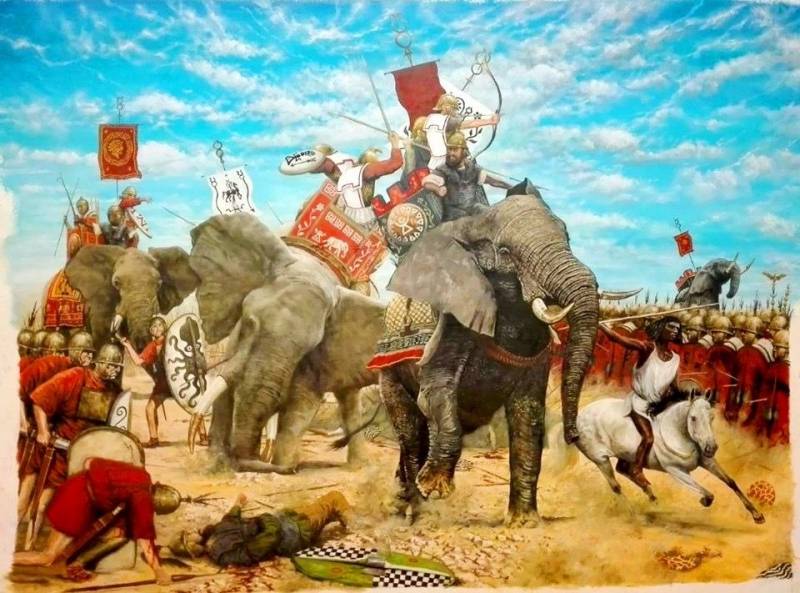
Matthew Ryan. Battle of Zama
Rome and Carthage, the two superpowers of the Mediterranean, were simply doomed to a military conflict. Carthage did not like the appearance of impudent upstarts - the Romans - on the borders of their state. Gaining strength, Rome was not going to put up with the hegemony of the Punians.
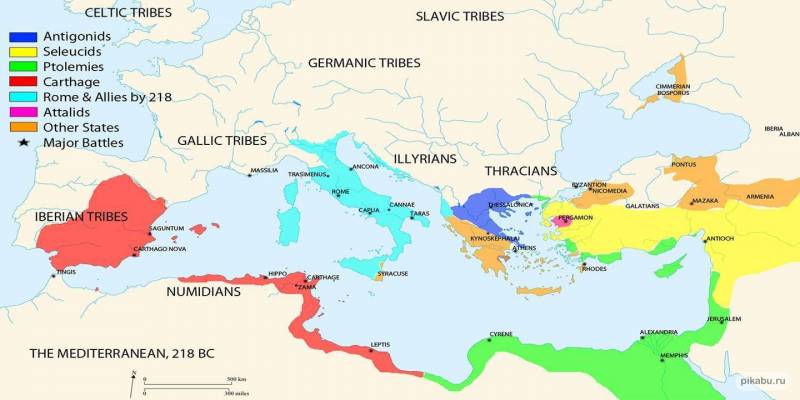
On this map, the possessions of Rome are marked in blue, Carthage in red.
Even Pyrrhus, leaving in 276 BC. e. Sicily, which he could not conquer, he said to his friends:
And in 264 BC. e. these states really entered the war, called the First Punic. It lasted 23 years and ended in 241 BC. e. the victory of Rome, which got this fertile island.
Second Punic War
The Punians compensated for the loss of Sicily by conquering lands in the Iberian Peninsula. They discovered rich deposits of silver here, which allowed Carthage to revive its military power, building new ships and recruiting mercenaries.
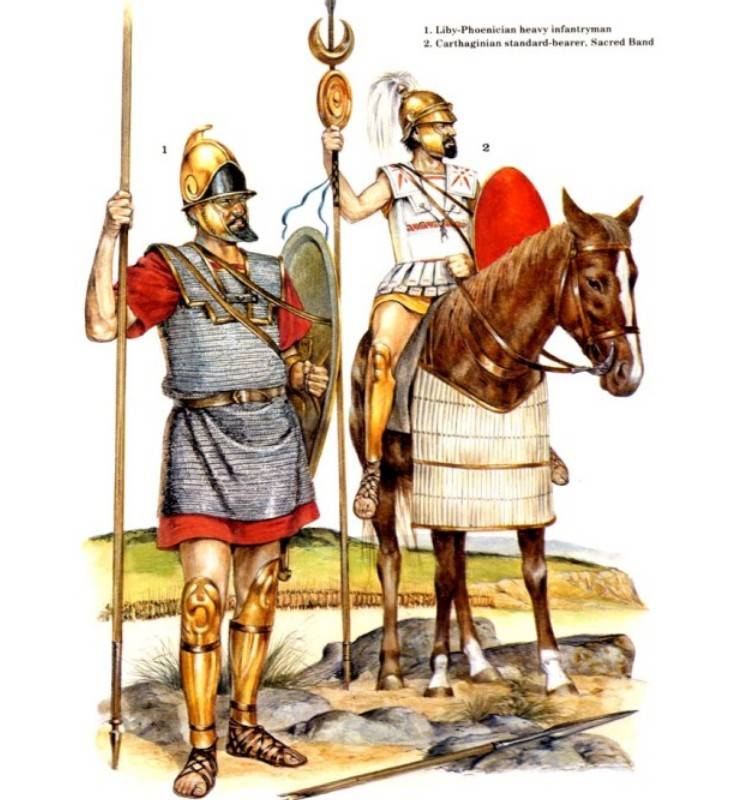
Warriors of Carthage during the Second Punic War
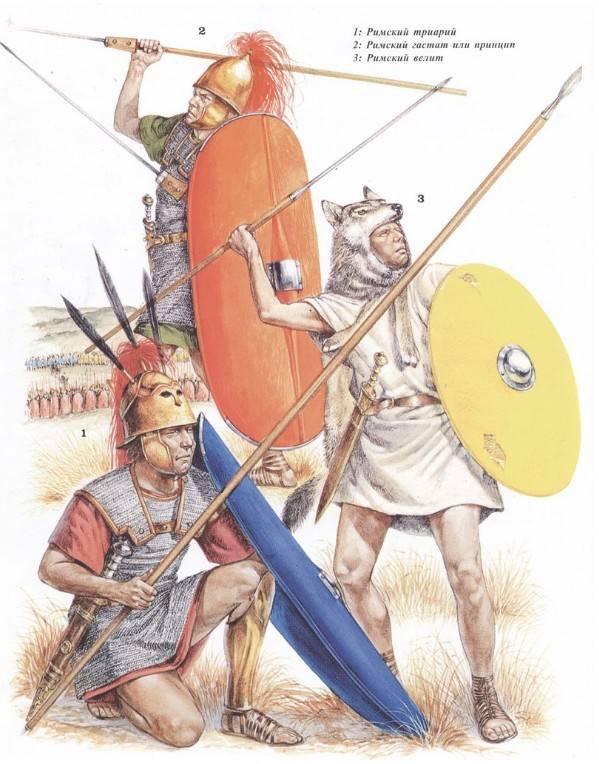
Roman soldiers during the Second Punic War
In 221 BC. e. 26-year-old Hannibal Barkid, the son of the commander Hamilcar, became the commander of the troops in Spain. At the age of 9, he swore an oath until the end of his life to be an implacable enemy of Rome and to avenge the defeat of his homeland in the First Punic War.
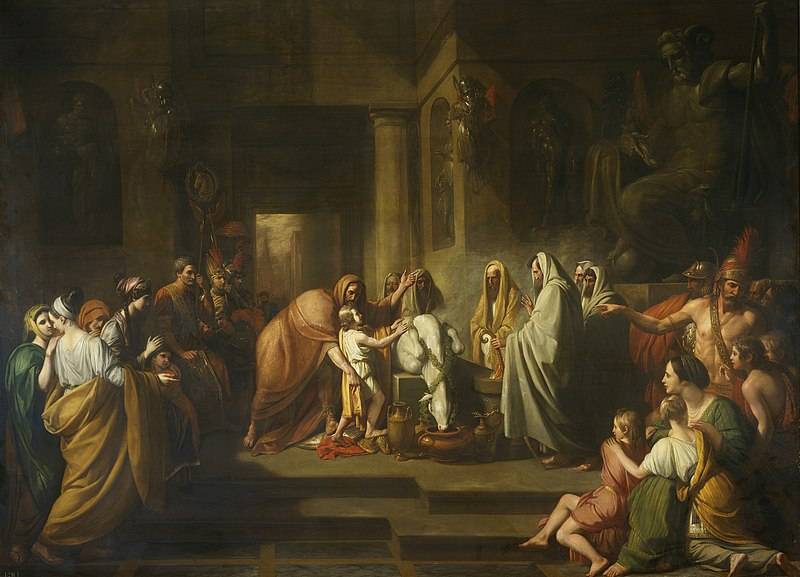
B. West. Oath of Hannibal
Hannibal began a new war, capturing in 218 BC. e. Allied to Rome, the Pyrenean city of Sagunt. What happened next is well known to anyone who is at least a little familiar with history. Having lost a significant part of his army during the crossing of the Alps, many horses and elephants (but having replenished his troops with warriors of tribes hostile to Rome), Hannibal triumphantly entered Italy. Here he won several high-profile victories in battles that are included in all textbooks on the art of war.
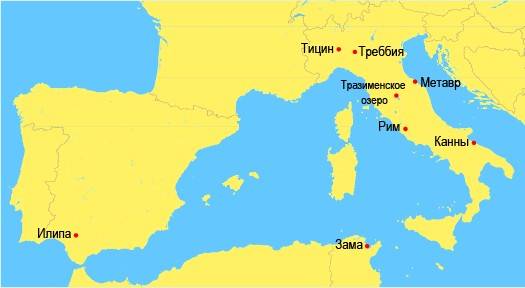
Sites of the main battles of the Second Punic War
However, Hannibal could not defeat Rome, and meanwhile in 209 BC. e. The army of Publius Cornelius Scipio, operating in the Spanish possessions of the Punians, captured the city of New Carthage. By the way, the Roman commander at that time was only 25 years old. In 207 B.C. e. at the Battle of Metaurus, he defeated the army of Hasdrubal Barkid, who tried to pass into Italy along the Adriatic coast. According to Titus Livius,
In the spring of 206, Scipio won the battle of Ilipa, where he was opposed by another brother of Hannibal, Magon, a participant in the battles of Trebbia and Cannae. In the summer of 205 BC. e. Mago landed with his troops in Liguria, the following year he managed to get reinforcements from Carthage. In 203, his army entered into a major battle with the Roman, but was defeated. Mago died of his wounds on a ship bound for Carthage.
And Scipio in the spring of 204 BC. e., having sailed from the coast of Sicily, he landed his army on the African coast northeast of Utica. It included the V and VI legions, which, after the defeat at the Battle of Cannae (216 BC), were sent to Sicily without paying soldiers a salary and with a ban on wintering in houses. In 213 BC. e. the representatives of these legions obtained permission to atone for their shame with blood. In addition to them, about seven thousand soldiers recruited in southern Italy were at the disposal of Scipio.
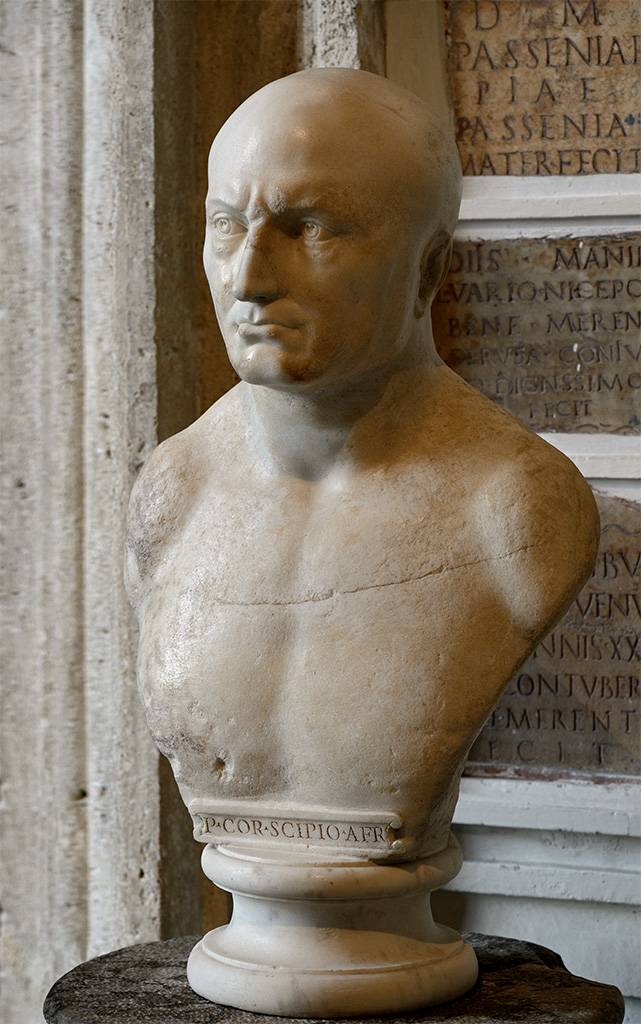
Scipio Africanus, bust from the gallery of the New Palace of the Capitoline Museums
Scipio's opponent was the Carthaginian commander Gisgon.
Scipio managed to win over the heir to the throne of Numidia - Masinissa. Together they defeated King Syphax, who took away the prince's bride, the Carthaginian princess Sofonib. However, Sofonib did not suit Scipio as the wife of the king of Numidia, because she could persuade him to ally with Carthage. And against Masinissa, the son of Syphax, Vermina, continued to fight. And so Scipio set a condition for his new ally: help against his enemy in exchange for the life of Sofoniba. The Numidian chose power and, according to Titus Livy, ordered his wife to be poisoned.
For two years, Scipio, in alliance with Masinissa, successfully fought in Africa, gradually occupying the territory of the modern coast of Tunisia and seriously complicating the delivery of food to Carthage. Finally, the Senate of Carthage decided to enter into peace negotiations and withdraw the armies of Mago and Hannibal from Italy. Hannibal with his troops arrived at home in the fall of 203 BC. e., located south of Carthage. The famous commander at that time was 45 years old.
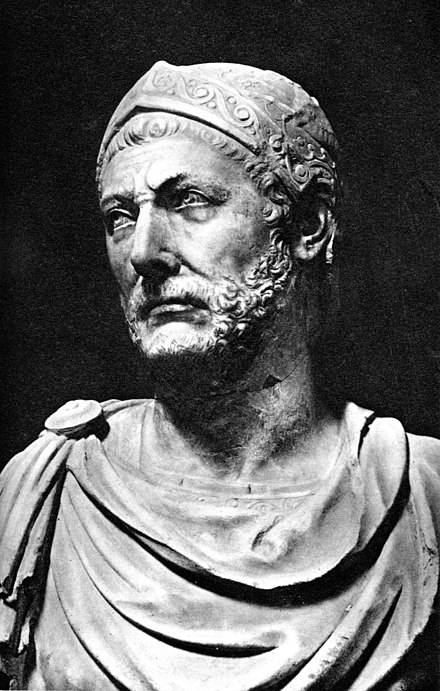
Hannibal, bust from the National Museum of Naples
Between Carthage and Rome, peace negotiations were then underway, and therefore hostilities were suspended. The Punic ambassadors managed to negotiate with the Roman Senate, but by the time they returned to their homeland with the news of peace, the situation in Carthage had changed. After the arrival of two armies and the seemingly invincible Hannibal, the influence of the "war party" hoping to take revenge increased. In addition, the Punians, after the arrival of the ambassadors, plundered the Roman ships with food, thrown ashore during a storm. The indignant Scipio demanded the return of the seized property, the Carthaginians arrogantly refused, and this became the reason for the resumption of the war. This time, Scipio, wanting to punish the Punians for treachery, acted much more cruelly than before. He refused to capitulate the Punic cities, giving them up for plunder and turning the inhabitants into slavery. Hannibal did not feel ready for a serious battle: he had few forces, and there were many recruits in the army. The elephants at his disposal were poorly trained and therefore potentially dangerous not only for the Romans, but also for the Carthaginians. However, the Senate hurried him to defend the Punic cities, besides, Hannibal learned that Masinissa was coming to the aid of the Romans with the Numidian cavalry. In turn, the Punians hoped to get help from Vermina, the son of the king of Western Numidia, Syphax, a rival of Masinissa.
The Carthaginian army camped near the city of Zama - 150 km west of Carthage. The Romans soon arrived. Hannibal made a last attempt to negotiate peace, but Scipio told him:
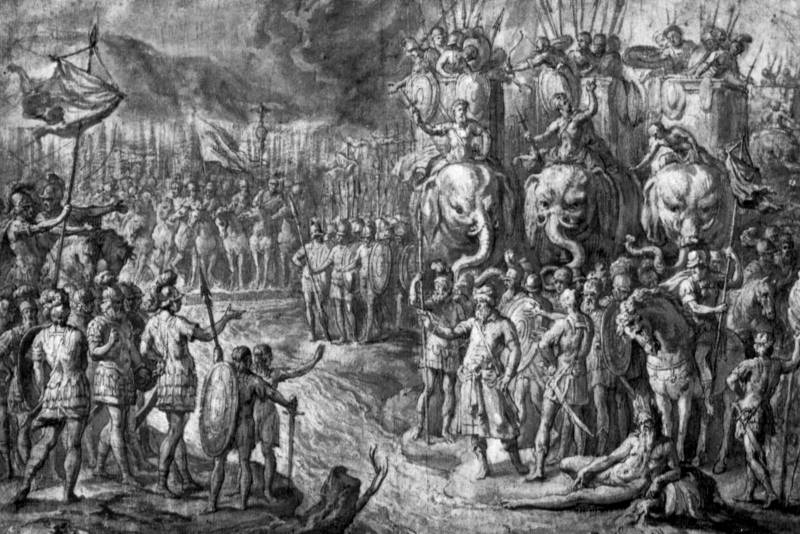
P. Rubens. Meeting of Scipio and Hannibal
And this meeting is depicted in an engraving of the late XNUMXth century (Hannibal on the left):
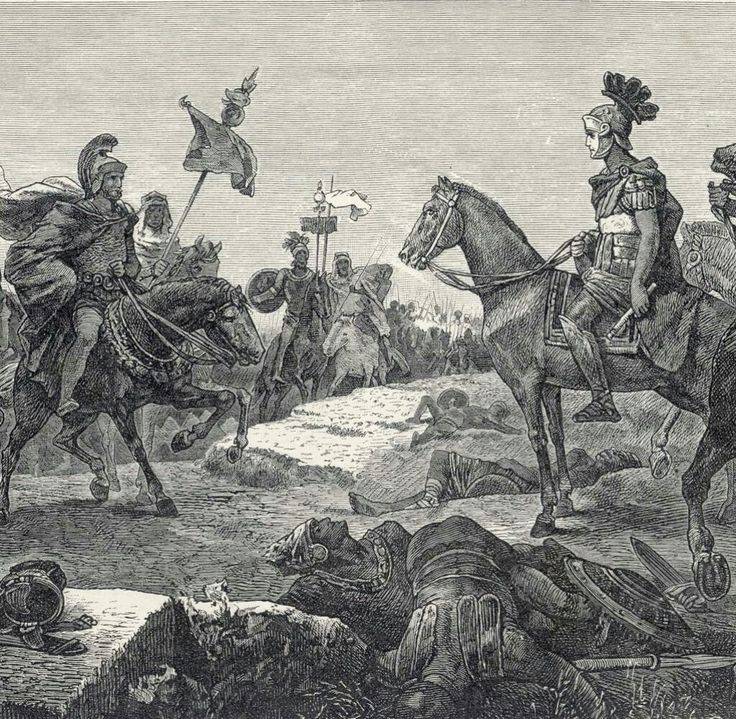
Ancient sources state that on the eve of the battle there was a solar eclipse. In 202 B.C. e. indeed, an eclipse of the sun was observed, and this allows us to date the battle on October 19. However, some researchers believe that the authors could slightly correct the date of the battle in order to emphasize the scale and significance of the event, to which even the heavens reacted.
The Romans were proud of the nobility of Scipio, who allegedly ordered the release of the Punic scouts caught in his camp. However, if we believe in the truth of this message, it can only be explained by assuming that Scipio was expecting the approach of Masinissa's units. And therefore, the Carthaginian spies released by him unwittingly misinformed Hannibal, bringing him unreliable information about the size of the enemy army.
Battle of Zama
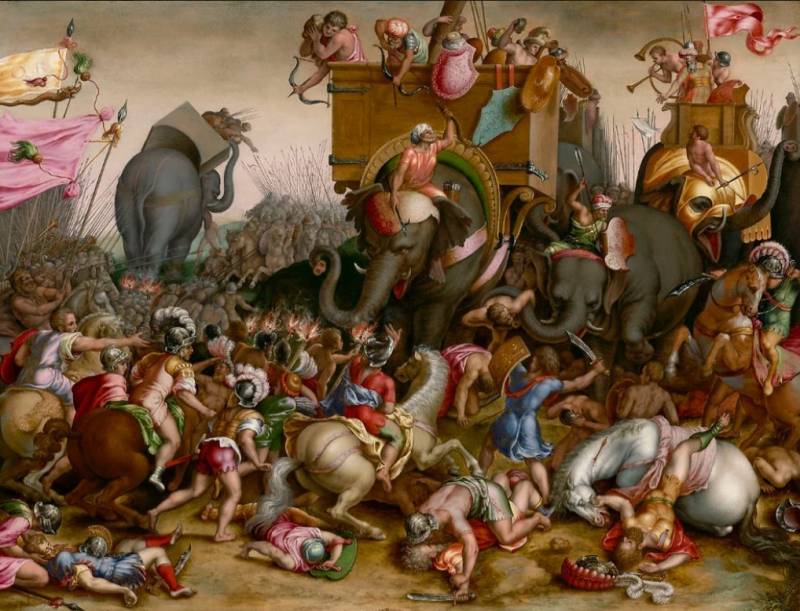
Cornelis Court. Battle of Zama
The Greek historian Polybius wrote of this battle:
Modern researchers estimate the number of enemy armies as approximately equal - approximately 35 thousand on both sides. However, the Romans had an advantage in cavalry, while the Carthaginians had elephants. It is known that the Roman and Carthaginian armies began to occupy their positions already at dawn. The battle began with oncoming attacks by Numidian light cavalry, units of which fought on both sides. Then 80 elephants of Hannibal went on the attack.
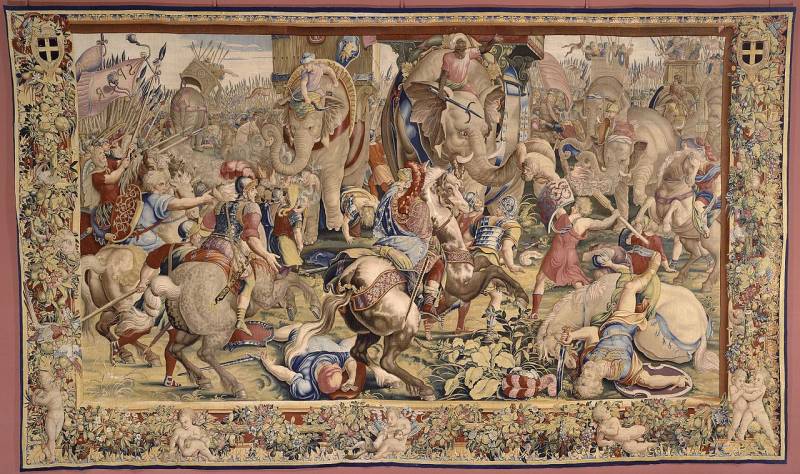
Jules Romain. La Bataille de Zama, tapestry, between 1688-1690
The Romans had already encountered enemy elephanteries, and Scipio, knowing about the elephants in the Punic army, built the maniples of the legions so that there were wide open spaces between them. The velites of the Romans fired at the elephants with arrows and darts, driving them into the "corridors" between the maniples. Some elephants in this situation generally turned to the left - right on the Carthaginian cavalry, which was ready for the next attack, crushing and upsetting its ranks. The blow of Masinissa's cavalry and Roman horsemen completed the rout, exposing the left flank of Hannibal's army. However, carried away by the pursuit of the enemy cavalry, they left the battlefield for a while. Things were not going well on the right flank of the Carthaginians either. But some elephants still reached the Roman maniples in the center and crashed into their ranks. Seeing this, Hannibal sent his infantry there: in the first line were mercenaries (Iberians, Gauls, Ligurians), in the second - Carthaginian militias and Macedonians. The veterans in the third line remained where they were.
And here, according to Polybius, the Punians refused to support the alien mercenaries, calmly watching their fight with the Roman soldiers. As a result, some of the mercenaries, having turned around, entered the battle with the warriors of the second line. It didn't really make sense. Probably, the mercenaries simply tried to flee from the battlefield, but the Carthaginians did not part, but began to drive them forward, acting as a barrage detachment.
One way or another, the first line of the Roman system, which suffered heavy losses during the attack of the elephants, was overturned by the Punians. However, the principles of the second line held their positions. Now it was the turn of the reserves: the veterans of Hannibal and the triarii of Scipio entered the battle. According to Polybius, the bitterness of the parties reached its limit, and for two hours the fate of the battle hung in the balance, until the Roman-Numidian cavalry hit the Carthaginian ranks from the rear, returning to the battlefield after pursuing the defeated enemy cavalrymen. This blow decided the outcome of the battle.
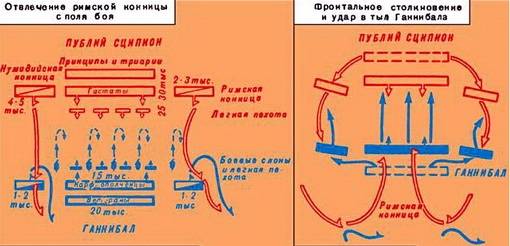
Schematic of the Battle of Zama 19 October 202 BC e.
The Carthaginian army was defeated, losing, according to various sources, from half to two-thirds of the soldiers. Of the outcome of this battle, Polybius writes:
Hannibal himself barely escaped death or captivity.
The losses of the Romans were also great (up to two and a half thousand people), but they retained a combat-ready army, while there was actually no one to defend Carthage.
Results of the Battle of Zama
Now the Senate of Carthage had no choice but to make peace on Rome's terms. Carthage lost all overseas territories, almost the entire fleet (the winners graciously left him 10 ships), the right to declare war without the permission of the Roman Senate. In addition, an indemnity of 10 thousand talents was imposed on the state of the Punians, which Carthage had to pay for 50 years. Rome became the master of the Mediterranean. But even this was not enough. After 55 years (in 146 BC), Carthage was defeated in the Third Punic War and was destroyed.
The fate of the generals
Despite the defeat, Hannibal maintained high authority in Carthage. It is believed that before 199 BC. e. he continued to lead the army of this state, and in 196 he became a Suffet (two Suffets were the highest officials of Carthage). However, Hannibal's political opponents accused him before the Roman Senate of preparing a new war in alliance with the Seleucid king Antiochus III. It is difficult to say how much this information corresponded to the truth, but Hannibal fled precisely to the state of the Seleucids. Later in Ephesus, he once again met with Publius Cornelius Scipio. In a conversation with him, he called himself the third greatest commander in history (after Alexander the Great and Pyrrhus), adding that in the event of a victory over Scipio, he would consider himself the first. During the Antiochian war of the Seleucids with Rome (192-189 BC), Hannibal commanded a squadron of ships, but was defeated in battle with fleet Rhodes. Concluding a peace treaty, the Romans demanded that Antiochus extradite his long-time enemy. Hannibal fled again - this time to the island of Crete. Then he visited Armenia and Bithynia. Cornelius Nepos claims that during the war of the Bithynians against Rome's allied Pergamon, Hannibal put the enemy's fleet to flight by throwing clay pots with poisonous snakes at his ships. However, the king of Bithynia, Prusius, betrayed his guest, and in order not to fall into the hands of the Romans, Hannibal took poison from the ring, which he always carried with him - either in 183, or in 181 BC. e.
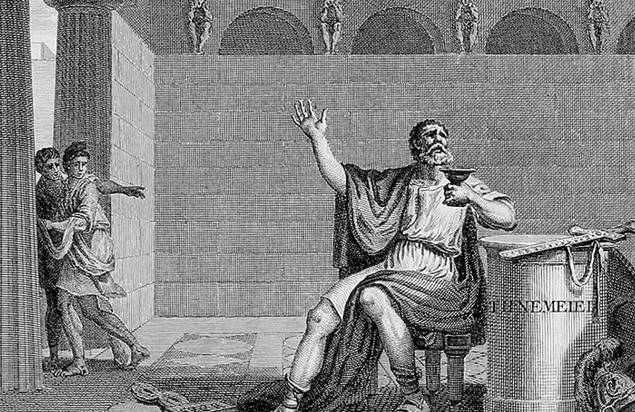
The Death of Hannibal in an engraving from 1799
It may seem surprising, but the winner of Hannibal, Publius Cornelius Scipio, also ended his life in exile. The enemies accused the commander and his brothers of various abuses. Titus Livy reports that the people of Rome were on the side of the victorious Hannibal:
But Scipio still chose to leave Rome and go to his estate. Here he died a year later (in 183 BC) - at the age of 52.
Information